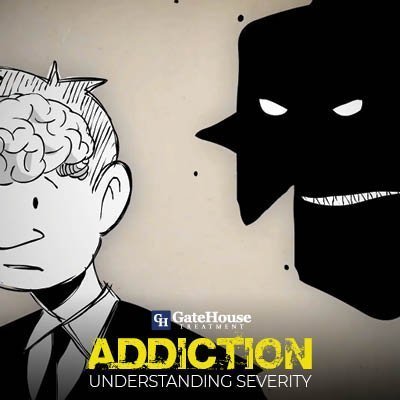
Another episode in the Addiction Series by the Addiction Policy Forum has come out. The Addiction Policy Forum started releasing the Addiction Series to educate the public on how addiction happens, how addiction affects those with substance use disorders, and how to appropriately treat those struggling with a substance abuse disorder. Episode 3 of the Addiction Series is titled “Understanding Severity.”
Addiction as a Chronic Illness
With addiction being a chronic illness, it gets worse over time. As someone with a substance use disorder progresses through the stages of addiction the addiction gets more severe. As with any other chronic illness, if it’s left untreated, the illness will worsen. When addiction worsens, it leaves more room for mental and physical health problems to accompany the substance use disorder, and the quality of life goes down as well.
As the substance use disorder progresses, the risk of death increases. The risk of death is one of the reasons that treatment for substance use disorders is so crucial. For treatment to be appropriate for each person, their severity of dependence must be determined. Starting treatment for a substance use disorder as early as possible is also the best way to get onto the road of recovery.
The Levels of Severity of Substance Use Disorders
There are 4 levels of severity for a substance use disorder, and it is determined based on 3 categories. The levels of severity vary from .5 – 3. Anyone who is over the .5 level of severity, meaning they are at risk for developing a substance use disorder, and has a moderate change of developing substance abuse issues if their behavior doesn’t change. An at-risk person is someone who uses drugs and alcohol in risky ways but isn’t experiencing a full disorder. A person with a mild substance use disorder is at level 1. The next step of severity is a moderate substance use disorder or a level 2, while level 3 is considered high also known as an addiction.
The severity is determined by a list of symptoms, and the score of these symptoms correlates to the severity of the substance use disorder. The symptoms are in 3 separate categories: control, how it affects your life, and physical dependence.
The category that pertains to control, are symptoms such as using more of a substance or more often than intended to or wanting to stop but being unable to. Substance use disorders can begin to affect your life very early on from neglecting responsibilities and relationships, to giving up activities due to substance use. The symptoms of physical dependence can also vary from which substances are being used. Dependence also covers if there is a tolerance to the substances, if more of the substance is needed to achieve the same effect; tolerance has been developed. Tolerance does not automatically mean there is an addiction or a severe substance use disorder.
Determining Treatment for Substance Use Disorders
Knowing the severity of a substance use disorder is the first step in understanding a person’s illness, and the risk for serious events such as an overdose. Knowing the level of severity allows a doctor to formulate the best treatment plan for each person suffering from a substance use disorder. Knowing the best course of action for the level of severity is crucial towards properly addressing the substance use disorder. More treatment is better if it’s the right kind of treatment.
Someone with a severe substance use disorder wouldn’t benefit from starting out with an Intensive Outpatient level of care. They would likely end up actively using substances again, or while still at that level of care. Someone with a mild substance use disorder or even in the at-risk level of severity could benefit from a less intensive treatment program.
As the treatment progresses for substance use disorders, the person should be stepped down to less intensive levels of care. Stepping down levels of care is the best way to reintegrate into living without the use of substances. On the other hand, someone that falls into the mild severity of a substance use disorder probably won’t benefit from inpatient treatment as much as someone with a severe disorder.
Understanding severity helps to allow for the best treatment to be utilized for every individual that is dealing with a substance use disorder. If you or someone you know is suffering from any level of substance use disorder, reach out to GateHouse Treatment today at (855) 448-3588.
- Cymbalta Withdrawal: Causes, Symptoms, And Management - October 12, 2023
- Boredom in Recovery: 5 Tips to Avoid Relapse - October 6, 2023
- Overconfidence and Rehab: Avoiding Relapse - October 4, 2023




